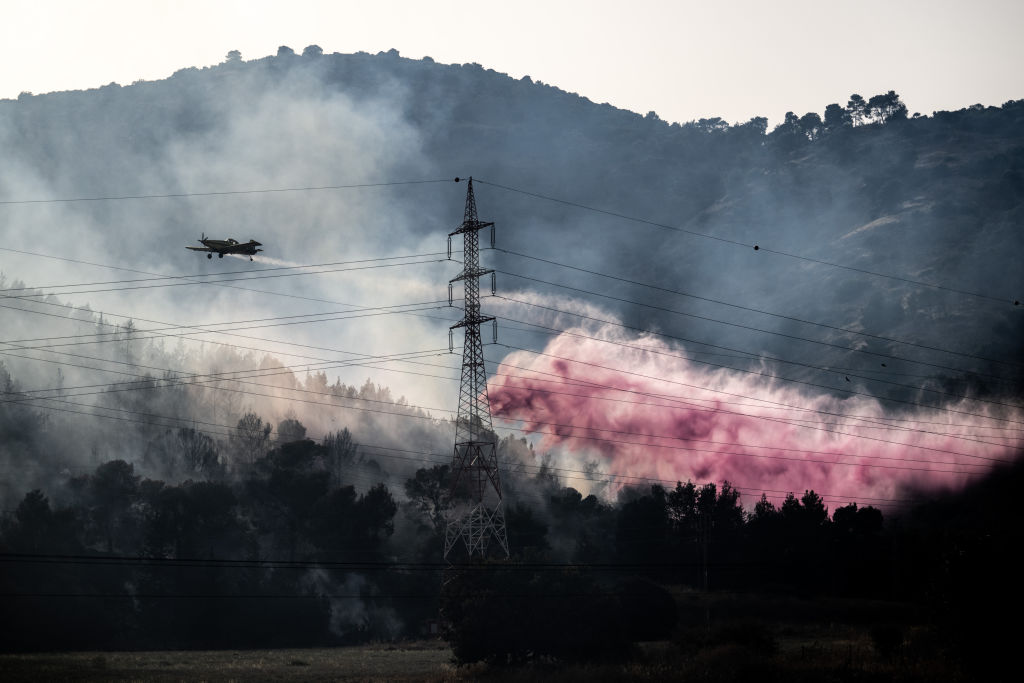Hezbollah launched hundreds of rockets and drones against Israel on Sunday in retaliation for the assassination of a senior commander in Beirut last month, the Iranian-backed movement said, as Israel’s cabinet met to prepare a response.
Israeli jets hit targets in Lebanon shortly before the strikes as the military assessed that Hezbollah was preparing to begin the barrage, the military said.
Hezbollah said it had launched more than 320 Katyusha rockets towards Israel and hit 11 military targets. It said the barrage had completed “the first phase” of its response to the assassination of Fuad Shukr, a senior commander, in Beirut but that the full response would take “some time”.
Expectations of an escalation between the two sides had risen since a missile strike in the Israeli-occupied Golan Heights last month killed 12 youngsters and the Israeli military assassinated Shukr in Beirut in response.
Israel’s cabinet was to meet at 7 a.m. (0400 GMT), Prime Minister Benjamin Netanyahu’s office announced.
Foreign Minister Israel Katz said Israel would respond to developments on the ground but did not seek a full-scale war. Defence Minister Yoav Gallant said Israel would do whatever necessary to defend itself.
“We have conducted precise strikes in Lebanon in order to thwart an imminent threat against the citizens of Israel. We are closely following developments in Beirut, and we are determined to use all the means at our disposal in order to defend our citizens,” Gallant said in a statement.
Most of the Israeli strikes were hitting targets in southern Lebanon but the military was ready to strike anywhere there was a threat, an Israeli military spokesperson said.
Gallant declared a state of emergency, and flights to and from Ben Gurion airport in Tel Aviv were suspended for around 90 minutes, but the airports authority said normal operations were expected to resume by 7 a.m.
In northern Israel, warning sirens sounded and multiple explosions were heard around several areas as Israel’s Iron Dome aerial defence system shot down rockets coming from southern Lebanon. Israel’s Magen David Adom ambulance service said it was on high alert all over the country.
The Israeli military issued civil defence instructions from central Israel to the north, limiting gatherings but authorising people to go to work as long as they were able to reach air raid shelters quickly. There were no casualties immediately reported in Israel, according to the ambulance service.
FEARS OF REGIONAL CONFLICT
A security source in Lebanon said at least 40 Israeli strikes had hit various towns in the country’s south in one of the densest bombardments since hostilities began in October.
A resident of the southern Lebanese town of Zibqeen, some 7 km (4 miles) from the border, told Reuters it was the first time he had awakened “to the sound of planes and the loud explosions of rockets – even before the dawn prayer. It felt like the apocalypse.”
Israel’s Army Radio, citing defence officials, said the military assessed that Hezbollah had been preparing to fire hundreds of missiles into central Israel in an attack planned for 5 a.m.
Around 100 Israeli jets foiled the Hezbollah missile strikes, beginning their attack half an hour beforehand, the report said, adding that the military assessed the subsequent Hezbollah barrage was “improvised”.
“Dozens of (Israeli Air Force) jets are currently striking targets in various locations in southern Lebanon. We are continuing to remove threats, and to intensively strike against the Hezbollah terrorist organization,” said a military spokesman, Rear Admiral Daniel Hagari.
The Israel-Hezbollah escalation has drawn fears of a wider regional conflict, potentially involving both the United States and Iran. President Joe Biden was following events closely, the White House said.
“At his direction, senior U.S. officials have been communicating continuously with their Israeli counterparts. We will keep supporting Israel’s right to defend itself, and we will keep working for regional stability,” said National Security Council spokesperson Sean Savett.
The strikes came as negotiators were meeting in Cairo in a last-ditch effort to conclude a halt to fighting in Gaza and a return of Israeli and foreign hostages in exchange for Palestinian prisoners.
Hezbollah fired missiles at Israel immediately after the Oct. 7 attacks by Hamas gunmen on Israel. Hezbollah and Israel have been exchanging fire constantly ever since, while avoiding a major escalation as war rages in Gaza to the south.
That precarious balance appeared to shift after the strike in the Golan Heights, for which Hezbollah denied responsibility, and the subsequent assassination of Shukr, one of Hezbollah’s most senior military commanders in Beirut.
Shukr’s death in an air strike was quickly followed by the assassination of Hamas political leader Ismail Haniyeh in Tehran, which led to vows of reprisal against Israel by Iran.
(Reuters)














